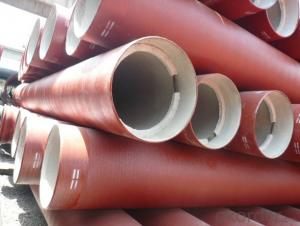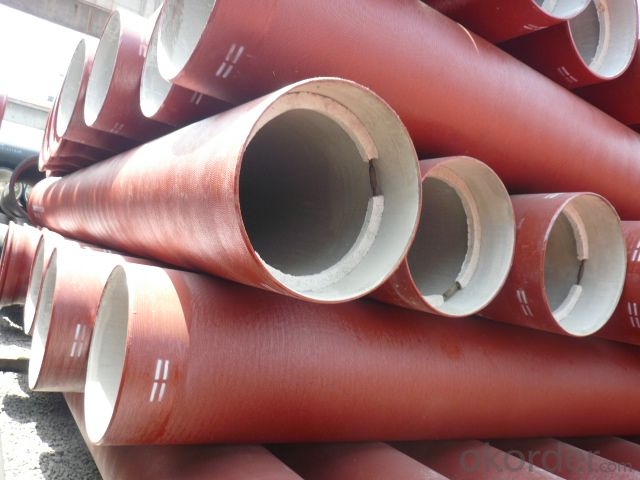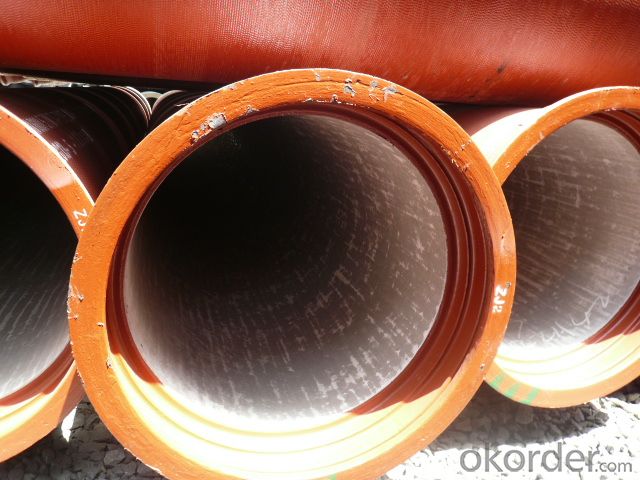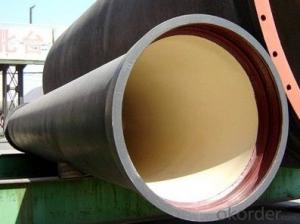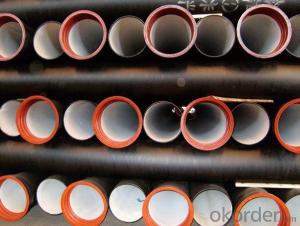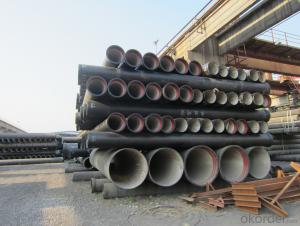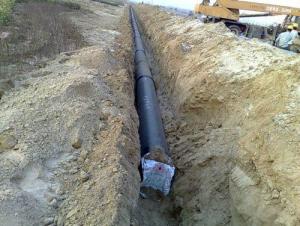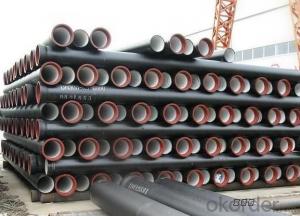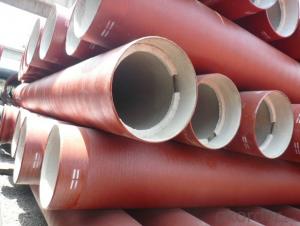Ductile Iron Pipe DN200-DN1000 EN545/EN598/ISO2531 For Waste Water
- Loading Port:
- China main port
- Payment Terms:
- TT or LC
- Min Order Qty:
- 25 m.t.
- Supply Capability:
- 200000 m.t./month
OKorder Service Pledge
OKorder Financial Service
You Might Also Like
1,Ductile Iron Pipe Description :
DI pipe fittings are manufactured according to ISO 2531 or BS EN545 or BS4772 FOR POTABLE WATER ,internal is cement lining or wet epoxy coating;External is zinc plus bitumen or wet epoxy coating. We also manufacture ductile iron fittings with fusion bonded epoxy both inside and outside. All the producets are sutible to water pipes fields.We have passed ISO9001,ISO14001,OHSMS18001 certificate.
2,Main Features of the Ductile Iron Pipe:
1. Material: Ductile iron grade 500-7/ 450-10 in accordance with ISO1083
2. Standard: ISO 2531, EN545, EN598, ANSI, AWWA
3. Certificate: ISO9001, ISO14001, SGS, NSF, WRAS
4. Test: In accordance with ISO 2531 / EN 545 / EN598 and 100% water pressure test
5. Length: 6m or cut into 5.6m, 5.7m, 5.8m
6. Internal Lining: Cement, conform to ISO4179
7. External coating: Zinc + Bitumen, conform to ISO8179
8. Rubber: NBR, SBR, EPDM according to ISO4633 / EN681.1
9. Note: The gaskets, bolts & nuts are supplied respectively as your special requirement
3,Ductile Iron Pipe Images:
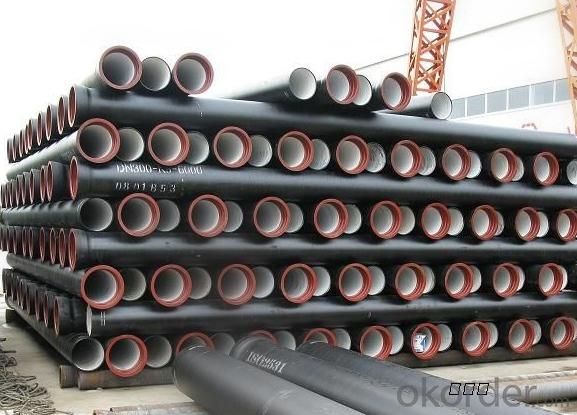
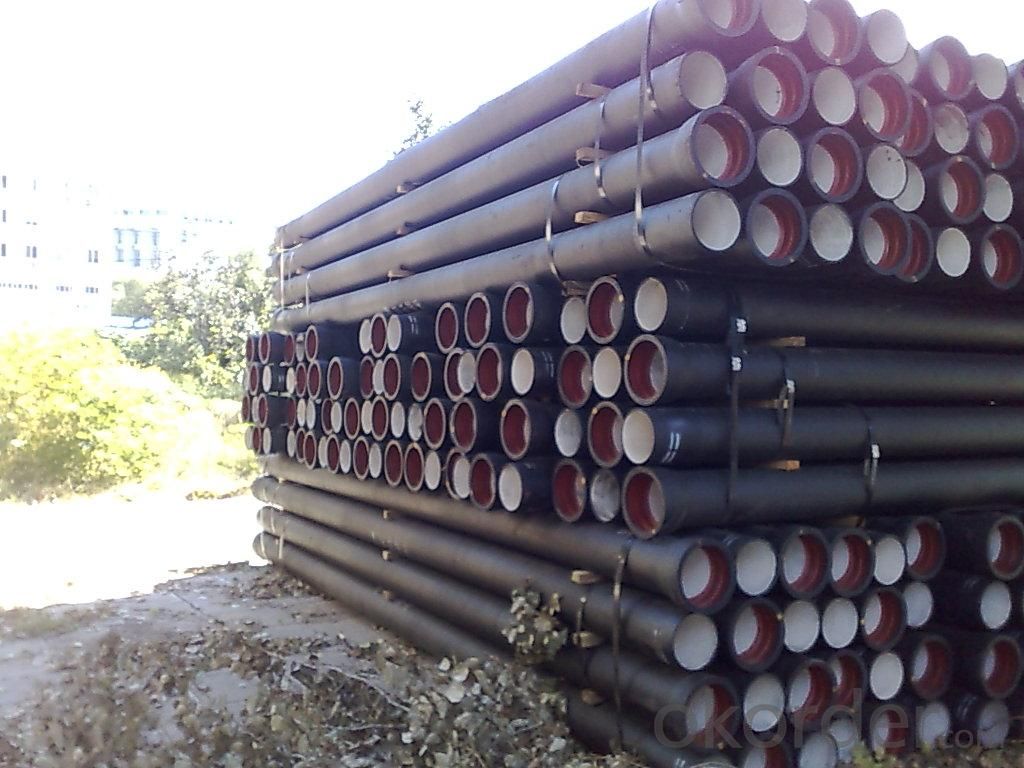
4.Ductile Iron Pipe Specification:
Internal lining: ductile iron pipes shall have an internal cement mortar lining in acc with ISO4179.
External coating: ductile iron pipes shall be externally coated with metallic zinc spray plus a further layer of resin painting to ISO8179.
Gasket: 100% SBR/NBR/EPDM rubber gasket in accordance with ISO4633.
Packing: ductile iron pipes from DN100 to DN300 be bundled with steel belts, others are in bulk.
Payment term: L/C, T/T.
5.FAQ:
We have organized several common questions for our clients,may help you sincerely:
1.Q: Why would you choose ductile iron pipe rather than other pipe materials?
A:The reasons are obvious for that not only ductile iron pipe possesses the inherent strength and flexibility of ductile iron, combined with proven corrosion protection systems, but also the cost savings can be achieved from design to installation and commissioning.
2.Q:Why can you guarantee the inner of pipes can’t be corroded?
A: High alumina cement mortar lining and sulphate-resistant cement mortar lining. These two special linings are applicable to inner anti-corrosion for sewage pipes, improving resistance to erosion of the sewage components.
- Q: It's not easy to drill ductile iron with cobalt high speed steel bit. Please help to point it out
- Determine the authentic M35 cobalt bit, which is about 65HRC in hardness. General workpiece hardness of about 45HRC or less of the problem.
- Q: Can ductile iron pipe be used for gas distribution systems?
- Indeed, gas distribution systems can utilize ductile iron pipe. Ductile iron, being a robust and enduring substance, exhibits resistance to corrosion, thus rendering it suitable for subterranean applications. Its capacity to endure high pressure and furnish a dependable and enduring solution has led to its widespread employment in gas distribution systems for numerous years. Moreover, ductile iron pipes are acknowledged for their pliability, facilitating simpler installation and upkeep. Nevertheless, it is imperative to guarantee conformity with the specific requirements and standards of gas distribution systems when implementing ductile iron pipes to ensure the system's safety and efficiency.
- Q: Can ductile iron pipe be used for water treatment plant sludge handling?
- Indeed, water treatment plant sludge handling can utilize ductile iron pipe. Renowned for its robustness and longevity, ductile iron pipe is well-suited for managing diverse fluid types, such as sludge. It possesses the ability to endure the corrosive characteristics of sludge and remains resistant to abrasion, a crucial aspect in any sludge handling system. Moreover, the smooth interior surface of ductile iron pipe aids in preventing obstructions and facilitates the smooth flow of sludge, resulting in enhanced efficiency. In conclusion, ductile iron pipe is an dependable option for water treatment plant sludge handling.
- Q: What is the expected buoyancy of ductile iron pipes?
- Several factors, including diameter, wall thickness, and fluid specific gravity, can influence the expected buoyancy of ductile iron pipes. However, in general, ductile iron pipes are recognized for their relatively low buoyancy compared to materials like plastic or concrete. Ductile iron pipes possess a higher density and weight, resulting in a greater resistance to buoyancy forces. This quality makes them suitable for applications where buoyancy is a concern, such as water and wastewater transmission systems. Their inherent strength and weight combination ensures that the pipes stay grounded and do not float or rise to the surface. It is important to acknowledge that despite the lower buoyancy of ductile iron pipes compared to other materials, there may still be some level of buoyancy in certain scenarios, particularly when the fluid being transported has a lower specific gravity. To address this potential issue, measures like anchoring or ballasting can be employed to guarantee the stability and integrity of the pipeline system. In conclusion, while the expected buoyancy of ductile iron pipes is generally low, it is crucial to consider the specific conditions and requirements of the project to determine the most suitable pipe material and design for optimal performance and safety.
- Q: Can ductile iron pipes be used for underground storage tanks?
- Ductile iron pipes can indeed be used for underground storage tanks in certain situations. Ductile iron is a strong and durable material that is resistant to corrosion, making it suitable for underground applications. However, there are a few factors to consider before using ductile iron pipes for underground storage tanks. Firstly, it is important to assess the specific requirements and regulations of the project. Different regions and industries may have specific guidelines for the materials used in underground storage tanks. It is crucial to ensure that ductile iron pipes comply with these regulations and meet the necessary standards for underground storage. Secondly, the size and capacity of the storage tank should be considered. Ductile iron pipes are available in a variety of sizes, but they may not be suitable for large-scale storage tanks due to limitations in their dimensions. It is important to consult with engineers or experts to determine the appropriate pipe size and capacity for the specific storage requirements. Lastly, the design and installation of the underground storage tank should be carefully planned. Proper sealing and protection against external factors such as soil movements, water pressure, or other potential hazards should be considered. Adequate measures should be taken to prevent leaks or damage to the pipes, ensuring the safety and longevity of the storage tank. In conclusion, ductile iron pipes can be used for underground storage tanks, but it is essential to consider the specific requirements, regulations, sizing limitations, and proper design and installation. Consulting with professionals in the field and adhering to industry standards will ensure the successful use of ductile iron pipes for underground storage tanks.
- Q: Can the underground cast iron pipes be connected with clamps to form buttress?
- The hoop has the advantages of beautiful appearance, convenient operation, strong clamping force, good sealing performance, etc.. Mainly used for connecting and fastening vehicle, ship, diesel engine, gasoline engine, machine tools, fire, and other machinery and equipment, chemical equipment general nylon hose, plastic hose, hose cloth, water interface and seal etc..
- Q: What is the expected bending stress capacity of ductile iron pipes?
- The expected bending stress capacity of ductile iron pipes can vary depending on various factors such as the pipe's diameter, wall thickness, and the specific grade of ductile iron used. However, generally speaking, ductile iron pipes have a high bending stress capacity compared to other pipe materials. Ductile iron pipes are known for their high tensile strength and flexibility, making them capable of withstanding significant bending stresses. The exact bending stress capacity can be determined through rigorous testing and analysis by considering factors like the pipe's mechanical properties, dimensions, and the maximum allowable deflection. It is important to note that the bending stress capacity of ductile iron pipes should be evaluated in accordance with industry standards and guidelines. These may include standards such as the American Water Works Association (AWWA) C150 or International Organization for Standardization (ISO) 2531, which provide specifications and testing methods for ductile iron pipes. Ultimately, the expected bending stress capacity of ductile iron pipes is determined by several factors and should be assessed based on the specific requirements of the application, considering industry standards and guidelines for accurate and reliable results.
- Q: How can the cast iron pipe be connected?
- Depends on what type of, A type with flange connection, W type stainless steel band clamp connection
- Q: Ductile iron pipe joint leakage
- The main reason for the leakage is that the installation is not in place, resulting in the loss of the apron. Sealed with cement or pipe head Hough section. Recommend the use of Hough section fast and convenient, and there is no menace from the rear.
- Q: Can ductile iron pipes be repaired if they get damaged?
- If ductile iron pipes sustain damage, it is indeed possible to repair them. To carry out the repair, the first step involves identifying the specific section of the pipe that has been damaged, followed by assessing the extent of the damage. In the case of minor damage, there are several techniques available for repair, including welding or applying epoxy lining. However, if the damage is more severe, it may be necessary to replace certain sections of the pipe. Professionals who specialize in pipe repair possess the necessary skills and equipment to accurately identify and effectively fix damaged ductile iron pipes, thereby guaranteeing their ongoing functionality and durability.
Send your message to us
Ductile Iron Pipe DN200-DN1000 EN545/EN598/ISO2531 For Waste Water
- Loading Port:
- China main port
- Payment Terms:
- TT or LC
- Min Order Qty:
- 25 m.t.
- Supply Capability:
- 200000 m.t./month
OKorder Service Pledge
OKorder Financial Service
Similar products
Hot products
Hot Searches
Related keywords
